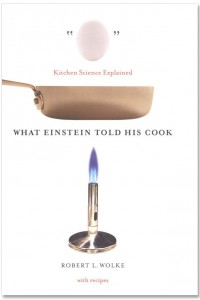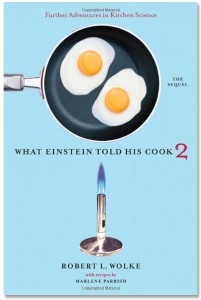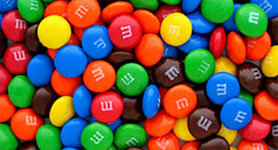 raphs: an egg, a saute pan and a Bunsen burner. “What Einstein Told His Cook” was sandwiched between the bottom of the pan and the blue flame emerging from the burner. My attention was immediately diverted and I picked up my new treasure and brought it to a table to further explore what the author had to say. And what an author he is! Robert L. Wolke, chemistry professor and Washington Post food columnist, writes this book with a scientific, yet relaxed tone. It’s an easy read with sparse black and white sketches to illustrate certain points and recipes scattered throughout to support his scientific reasoning behind what goes on in the kitchen.
raphs: an egg, a saute pan and a Bunsen burner. “What Einstein Told His Cook” was sandwiched between the bottom of the pan and the blue flame emerging from the burner. My attention was immediately diverted and I picked up my new treasure and brought it to a table to further explore what the author had to say. And what an author he is! Robert L. Wolke, chemistry professor and Washington Post food columnist, writes this book with a scientific, yet relaxed tone. It’s an easy read with sparse black and white sketches to illustrate certain points and recipes scattered throughout to support his scientific reasoning behind what goes on in the kitchen.
 ad this book cover to cover within a week. If you are a hard core food scientist, you may not learn a ton of information, but I can guarantee that you will learn something and you will have a great resource when you find yourself perplexed in the kitchen. If you are a novice in the food science world with a desire to know more, you will fall head over heels for this book. It will explain everyday kitchen events in a way that you will understand.
ad this book cover to cover within a week. If you are a hard core food scientist, you may not learn a ton of information, but I can guarantee that you will learn something and you will have a great resource when you find yourself perplexed in the kitchen. If you are a novice in the food science world with a desire to know more, you will fall head over heels for this book. It will explain everyday kitchen events in a way that you will understand.On certain questions that are more experimental, Wolke actually performs an experiment and explains what he did, why, and the results he obtained. This is such a “chemistry professor” approach and I love it!
 After telling a fellow food science geek (We can call each other that.) what I had purchased, he responded that it was a well-written book that he read because, as he puts it, “I can’t have some layman knowing something about food science that I don’t!”. haha
After telling a fellow food science geek (We can call each other that.) what I had purchased, he responded that it was a well-written book that he read because, as he puts it, “I can’t have some layman knowing something about food science that I don’t!”. haha
If you have ever wondered “Why do recipes tell you to use unsalted butter and then add salt?”, “How do various cooking oils compare?”, “Why does lasagna dissolve metal?”, “Why is meat near the bone sweetest?”, “What makes a container microwave safe?”, or “How do instant-read thermometers work?”…then What Einstein Told His Cook is for you. And when you finish with that book, check out What Einstein Told His Cook 2 for further food science secrets revealed!
What happenings in the kitchen leave you perplexed?





Sounds like an awesome read and is right up my ally, I may have to get a copy!